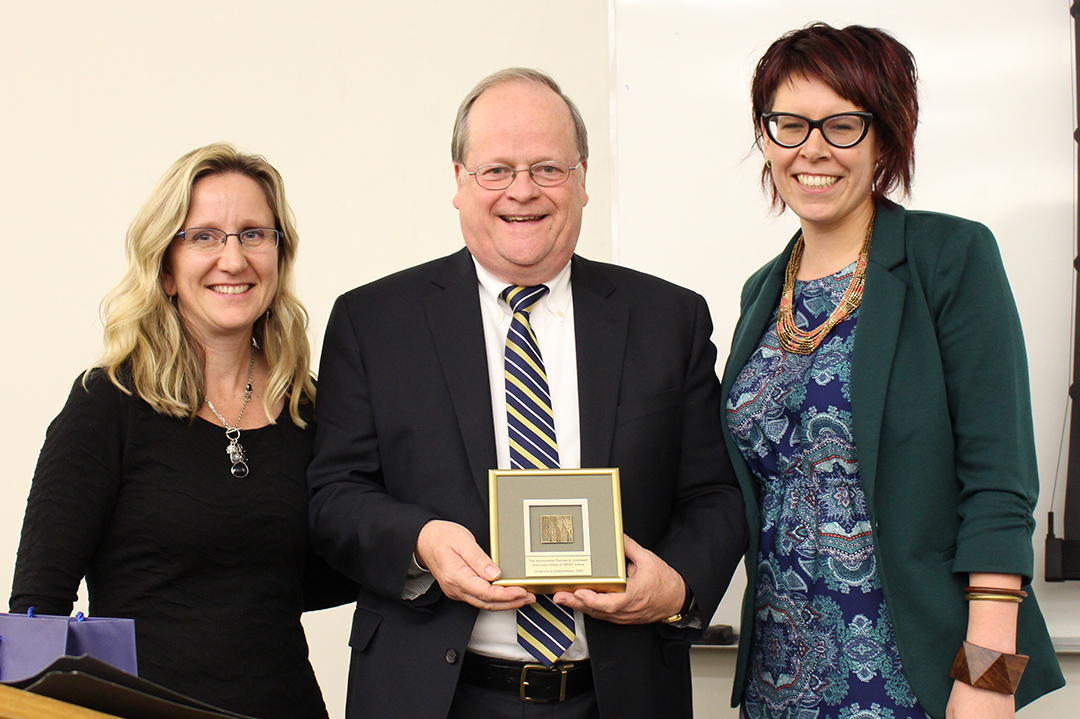
Cromwell named honourary fellow of CREATE Justice
Access to justice is something that has been on the Honourable Thomas Cromwell’s mind since his second year of law school, but he has difficulty pointing to a particular point in time when the initiative became his prime focus. Rather, it’s been a product of many experiences over the span of his career.
It’s that career that has Cromwell being named an honourary fellow of CREATE Justice, a U of S centre established in 2015 to address key gaps in data and access to justice research in Canada.
“During law school, I was lucky enough to be involved in a clinical program on prison law which was really all about trying to provide better access to justice for people who were incarcerated and from there I got involved in teaching civil procedure,” explained Cromwell, who retired from the Supreme Court of Canada in Sept. 2016. “That got me thinking about all kinds of questions about how the civil process worked, like who it worked for and who it didn’t, and the implications and costs.”
From there, Cromwell continued his involvement in access work through the Canadian Bar Association and ultimately through the Action Committee on Access to Justice in Civil and Family Matters—arguably his largest undertaking to date.
That committee, with Cromwell as chair, released the 2013 report Access to Civil & Family Justice: A Roadmap for Change. The document stressed the urgency to reform access to justice and set out a number of principles to guide that change.
More than three years after releasing the report, Cromwell is still a strong voice when it comes to access to justice in Canada.
“We need to be looking at how legal services are regulated and the economic impact of that regulation—it’s really a structural issue,” he said, adding that the profession needs to find more flexible methods of regulation that encourage access to services. “Encouraging innovation in the way legal services are made available so that it makes sense to lawyers, but also how those services are made more affordable for the people who need them”
While the challenges Saskatchewan faces when it comes access to justice aren’t completely unique from the rest of the country, Cromwell identified three challenges that are present in Saskatchewan, including: having to do better with the same or even less when economic times are tough; figuring out how to make sure that the legal services are accessible to those who need them in a population dispersed across a large amount of land; and focusing on making sure there is a strong civil justice system in place for Indigenous people.
“I think Saskatchewan faces challenges that are familiar to many, but I’m also really delighted and encouraged to see the developments that are taking place there.”
Those developments include the work of the Dean’s Forum on Dispute Resolution and Access to Justice, and more recently, the Saskatchewan Access to Justice Working Group and CREATE Justice.
“I think that there are wonderful opportunities being exploited and that the legal stakeholders in Saskatchewan are learning how to work together very effectively,” he said.
Cromwell pointed to strong innovation going on in the Ministry of Justice and the leadership of Glen Gardner, Assistant Deputy Minister, Justice Innovation, as an example.
“I think that the collaborative and co-operative approach that really started in the Dean’s Forum and led to the A2J working group and now the formation of CREATE—those are all extremely encouraging signs and present great opportunities for progress,” Cromwell said.
While Cromwell makes no mention of the positive impact of his own involvement in Saskatchewan’s Access to Justice movement, he’s been a major influence along the way. And that was the reason the College of Law decided to honour him by naming him a fellow of the new CREATE Justice Centre.
“Cromwell’s ongoing leadership with the National Action Committee on Access to Justice, his unwavering dedication to access to justice in general, and now his connection to CREATE Justice, will undoubtedly benefit access to justice not only in Saskatchewan, but nationwide,” said Martin Phillipson, dean of the College of Law.
“I consider it a very great honour,” said Cromwell. “Obviously, I’m not from Saskatchewan and I don’t have any formal links with the university, so I just feel extremely honoured to be recognized in this way and I hope that I’ll have an opportunity to contribute to the success of CREATE Justice over the coming years.”
